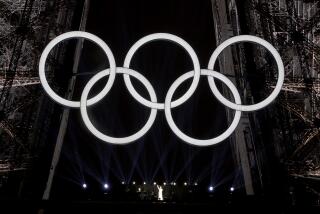PARIS OPERA BALLET : NUREYEV’S WEIRD ‘SWAN LAKE’
- Share via
NEW YORK — Tuesday night, for the Franco-American brouhaha benefit at the Metropolitan Opera, Rudolf Nureyev and his Paris Opera Ballet served chunky hors d’oeuvres.
Wednesday night came the real meal: good old, poor old “Swan Lake” as spiced, mangled, stretched and reheated by Nureyev himself.
Obviously, it was a “Swan Lake” destined to give any Petipa-and-Ivanov-respecting purist a bad case of indigestion.
It was, to begin with, a “Swan Lake” all about men. The ladies in the white tutus did their usual tippy-toe things. In this production, however, they were constantly overshadowed.
The swans and resident maidens had to contend with a hyperactive and overindulged male corps; with a Prince Siegfried who gets to do a lot more bravura dancing and dynamic emoting than is usually the case, and, most significantly, with a Rothbart oddly elevated to a central attraction.
Now 48 and a pathetic shadow of his former self on the stage, Nureyev has refocused “Swan Lake” in his own image.
Sometimes he still portrays the dashing young hero. Most often, however, he stalks the boards, glowers, flourishes the most massive of luxurious capes, flaps voluminously silky wings, dances odd interpolated solos, literally invades both the White and the Black Swan pas de deux, and, in malicious triumph, even rises heavenward on wires as the focal point of the final tableaux--all in the evil guise of the erstwhile secondary sorcerer.
This is the gimmick: Trapped in the tedium of royal reality, young Siegfried yearns for escape and romance. Odette thus becomes an idealized, elusive figment of his imagination, and, not incidentally, a woman with a very nasty, very dangerous alter ego. The Queen, who wants her boy to get married, becomes something akin to a castrating shrew.
Most important, the seemingly benevolent tutor, Wolfgang, is transformed by convenient reverie into the dominant figure identified in Nureyev’s program note as the “diabolical manipulator of souls and bodies.”
All this makes a certain degree of naive sense in writing. Unfortunately, it isn’t particularly well supported by Tchaikovsky’s score, and the quasi-neo-Freudian indulgences clash with what remains of the original Petipa and Ivanov rituals.
Moreover, the Paris production--blissfully applauded by the trendy New Yorkers--lumbers from dancing incoherence to narrative confusion to show-biz frenzy.
Nureyev’s choreography for the male principals projects little character and much extroversion. His choreography for the corps--a distressingly ragged, ungainly and undisciplined Parisian corps--is far too busy, too unmusical and too virtuosic for anyone’s comfort.
Ezio Frigerio’s bleak set, a stylized castle chamber with wall panels that conveniently slide to the side at dream time, represents utility-chic splendor. Franca Squarciapino’s costumes dress the court in pastel neo-Renaissance kitsch.
In the pit, a plodding Andre Presser beats time for an orchestra of seeming hacks.
Under the circumstances, the French principals tended to get mired in interpretive murk.
Charles Jude danced the Prince on Wednesday with clarity, vigor and a semblance of youthful elegance, with reasonable brilliance and dramatic vapidity. Elisabeth Platel, his dainty but strong Odette-Odile, offered a study in mannered indulgence, her ornithological line marred by floppy hands, her ubiquitously rubbery arms mocking the Plisetskaya legend.
Nureyev struck prefabricated poses in his self-styled star turn, but mustered neither the theatrical magnetism nor the caractere authority necessary to justify hogging the stage and distorting a masterpiece.
Some idols age better than others.
More to Read
The biggest entertainment stories
Get our big stories about Hollywood, film, television, music, arts, culture and more right in your inbox as soon as they publish.
You may occasionally receive promotional content from the Los Angeles Times.










